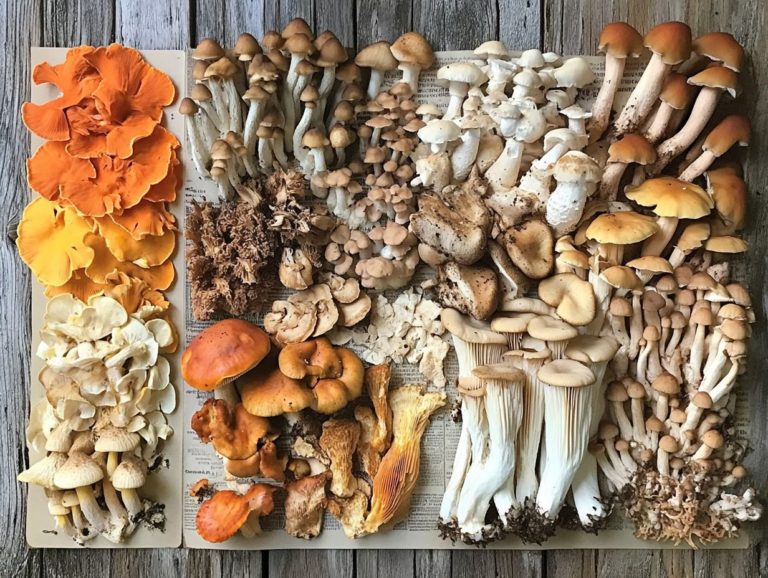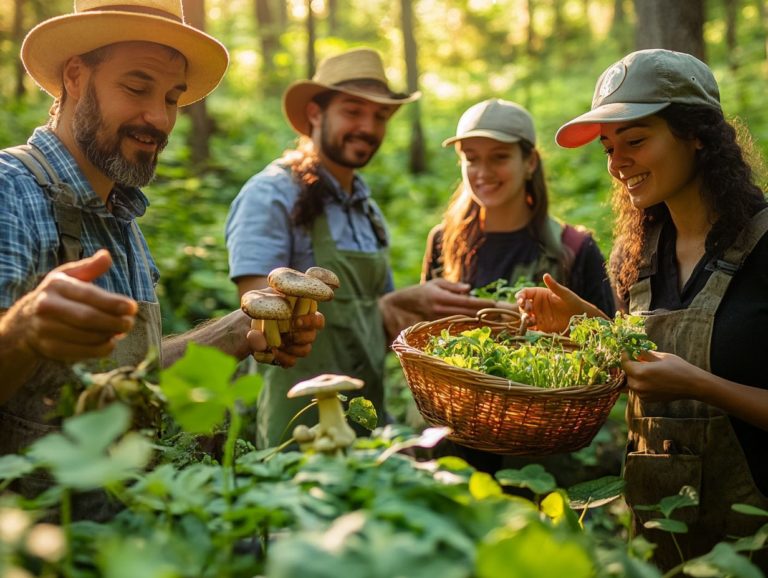What Are the Most Common Edible Herbs?
Edible herbs elevate flavors and offer health benefits. They have earned their place in kitchens worldwide, often featuring common edible herbs like basil, cilantro, and thyme.
This article delves into the diverse types of edible herbs, their culinary applications, and their health advantages, including herb preservation techniques. You ll also find valuable tips on how to seamlessly incorporate them into your diet and even cultivate them in your own home.
Jump into the vibrant world of edible herbs and discover how they can transform your meals!
Contents
Key Takeaways:
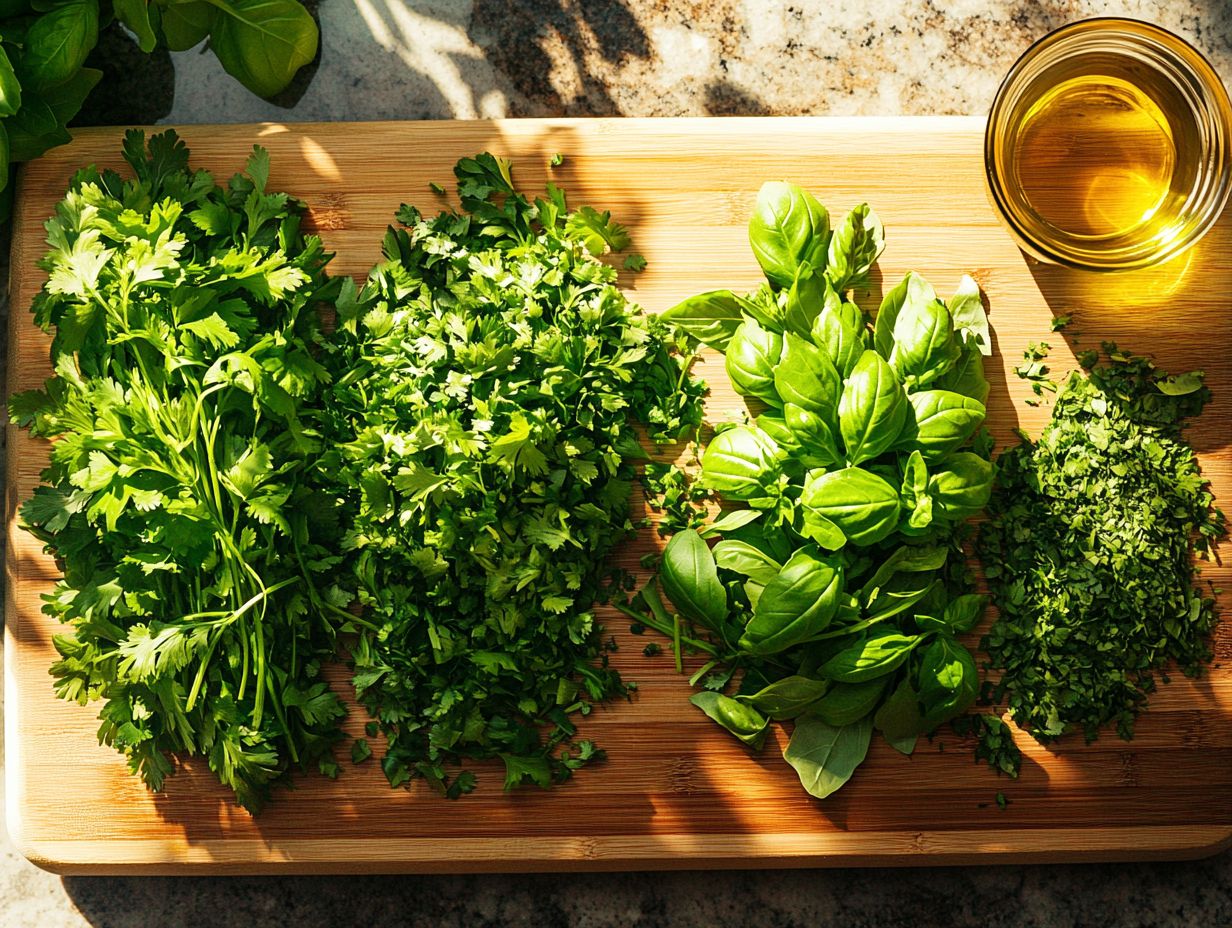
- Edible herbs offer both health benefits and enhance the taste of food.
- Some common edible herbs are basil, rosemary, and thyme.
- Growing your own herbs is a fun and easy way to add flavor to your dishes and save money.
What are Edible Herbs?
Edible herbs are delightful plants that you can savor for their flavors, healthy nutrients, and cooking flexibility. Think of herbs like basil, cilantro, and mint, each offering a unique twist to your dishes.
These aromatic wonders also come in vibrant colors, diverse shapes, and alluring aromas that awaken your senses. With thousands of species at your fingertips, each herb brings its distinct culinary flair. Basil imparts a sweet, peppery kick to Italian cuisine, while cilantro introduces a fresh, citrusy note that shines in Latin American and Asian dishes.
Historically, these herbs have served not only as essential ingredients in the kitchen but also held medicinal importance across various cultures. Foraging for these wild plants allows you to forge a deeper connection with nature, giving you the power to unearth the myriad flavors just waiting to be discovered in your own backyard.
With freshly picked ingredients in hand, you can elevate your cooking to new heights through creative herb uses and flavor pairings.
Benefits of Using Edible Herbs
The benefits of incorporating edible herbs into your daily diet are truly remarkable. They offer enhanced flavors in your dishes and a wealth of health benefits that support your overall well-being, whether through culinary herbs or edible wild plants.
Fresh herbs not only infuse your meals with vibrant colors and enticing aromas, but they are also brimming with essential nutrients, antioxidants, and anti-inflammatory properties. This makes them an essential addition to your culinary repertoire.
By weaving herbs like thyme, dill, and parsley into your cooking, you can transform simple dishes into extraordinary experiences while enjoying the myriad health perks these culinary gems provide. Understanding the uses and flavors of various herbs opens the door to creative culinary adventures, enriching both taste and nutrition in your kitchen.
Health Benefits
Edible herbs are more than just delightful flavor enhancers; they are a treasure trove of health benefits that elevate your diet to new heights. Many herbs possess remarkable health benefits that can aid in digestion, boost your immune system, and even uplift your mood. Take basil, for instance its anti-inflammatory effects are well-documented. Cilantro is packed with antioxidants.
By incorporating fresh herbs into your cooking, you infuse your meals with vibrant flavors while supporting your body s well-being. Understanding the unique health benefits of various edible herbs gives you the power to make informed decisions about how to integrate them into your daily diet.
Scientific research has underscored the impressive virtues of these herbs. Mint, for example, is renowned for its soothing properties, easing digestive discomfort and promoting a healthy gut. Rosemary may enhance memory and concentration, offering cognitive benefits that are hard to ignore.
Thyme boasts antimicrobial properties that can fortify your immune system. Recognizing how these herbs boost your wellness can transform your meals into health allies!
Culinary Uses
The ways to use edible herbs are truly extensive. They elevate ordinary dishes into remarkable gastronomic experiences with their unique and diverse flavors.
Incorporating herbs such as basil and cilantro into your sauces or marinades infuses vibrant notes that enhance the overall taste profile. For example, fresh basil pairs beautifully with tomatoes in a classic Caprese salad. Cilantro adds a zesty brightness to Mexican salsas that s hard to resist!
Understanding how to utilize these herbs through various cooking techniques, like grilling, saut ing, or garnishing, opens up exciting avenues for flavor exploration. Experimenting with the right herb combinations can lead to stunning entrees, such as a rosemary-infused roasted chicken or a tarragon-flavored vinaigrette.
This depth of knowledge allows for a more creative and satisfying cooking experience, transforming your culinary endeavors into something truly extraordinary.
Common Edible Herbs
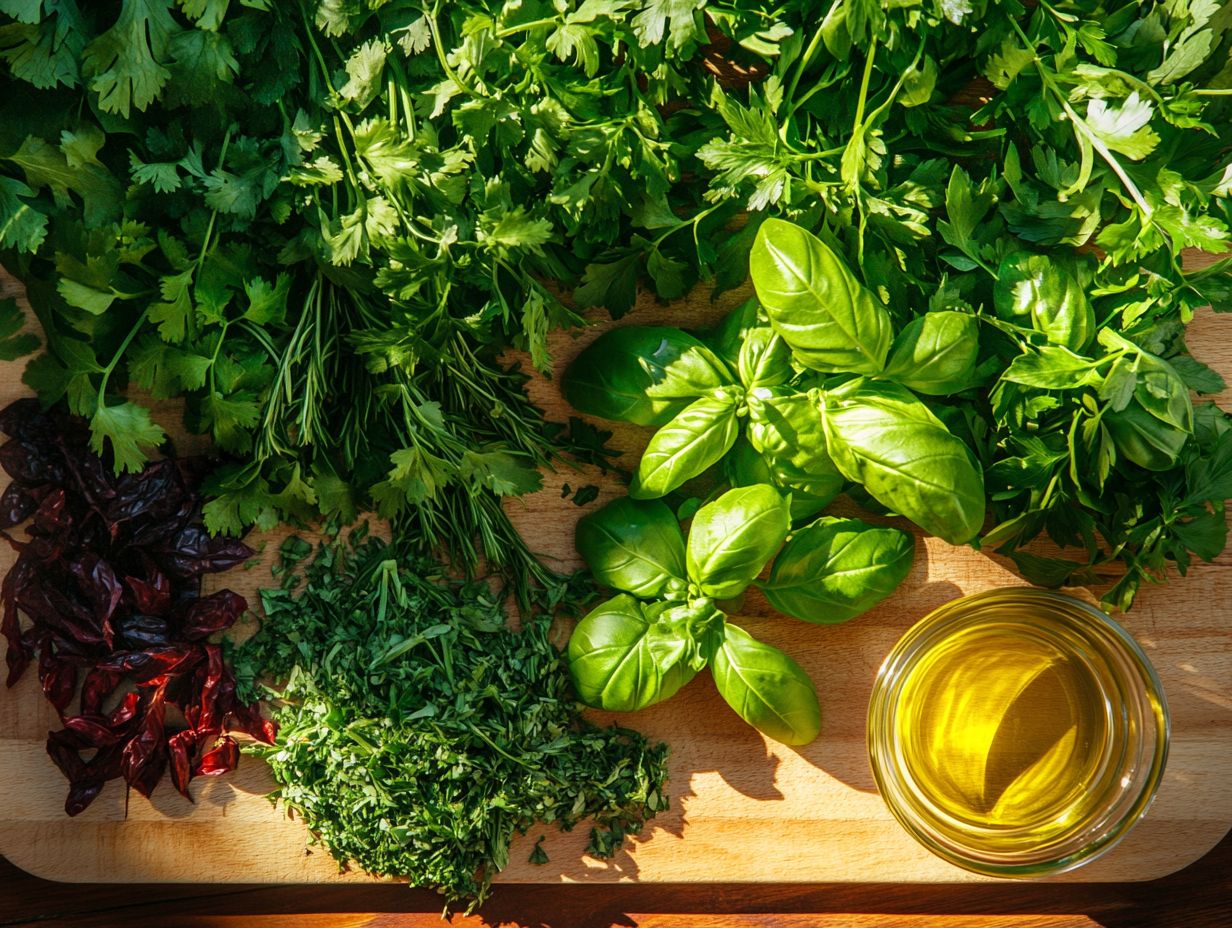
Common edible herbs are the heart of every herb garden. They infuse essential flavors and nutrients into countless dishes while being surprisingly easy to cultivate and maintain, especially when you consider the role of seasonal herbs in your garden. If you’re curious about other plants, you might want to explore what are the most common edible vegetables. Varieties like basil, cilantro, and parsley have earned their place as perennial favorites in kitchens across the globe, each contributing its distinct taste and health benefits.
Familiarizing yourself with the various herb types and their specific culinary uses allows you to make informed choices when planning your herb garden or selecting herbs for cooking. Understanding which herbs are seasonal helps you enjoy the freshest ingredients in your culinary creations.
Types of Herbs
There’s a captivating array of herbs, each defined by its unique characteristics, growing conditions, and culinary applications. This makes the world of herb varieties a delight for both enthusiasts and chefs.
Take leafy herbs like parsley and mint, for instance. Their aromatic leaves are treasures in the kitchen, often used fresh to elevate dishes with vibrant flavors.
Then there are seed herbs like fennel and caraway, which infuse warmth and spice into your cooking, perfect for pickling or seasoning.
Don t overlook root herbs such as ginger and turmeric; they contribute distinctive tastes and pack numerous health benefits, making them essentials in both culinary and natural remedy repertoires.
By grasping these distinctions, you can expertly prepare dishes that are not only delicious but also beneficial, fully embracing the potential of herb gardening.
Uses and Recipes
The uses of culinary herbs go well beyond mere seasoning. They are essential in elevating the overall quality and nutritional value of your dishes while embracing herb benefits.
Countless herb recipes showcase their remarkable versatility in cooking. Imagine vibrant pestos crafted from fresh basil or aromatic herb-infused oils these creations demonstrate how herbs can transform simple ingredients into gourmet meals.
By understanding the various ways to incorporate herbs into your cooking, you can inspire your creativity in the kitchen. Embrace healthier eating habits.
Incorporating fresh herbs into your everyday cooking can be as effortless as sprinkling chopped parsley over a finished dish. You can also stir in a teaspoon of thyme while saut ing vegetables.
If you’re eager to explore deeper flavors, consider using herb marinades herbs mixed with oil and spices to soak meats or seafood to infuse your dishes with delightful aromatic qualities.
Don’t shy away from experimenting with herb pairings in salads! You can also improvise herbal teas using leftover sprigs. These little adventures can lead to delightful culinary discoveries.
Bringing herbs into the spotlight not only enhances taste but also invites a playful approach to meal preparation. It encourages cooks at all experience levels to experiment and relish the process.
How to Incorporate Edible Herbs into Your Diet
Incorporating edible herbs into your diet is not just a simple task. It elevates your meals with bright flavors and remarkable health benefits, making it a must for cooking lovers and health-conscious individuals.
Whether you’re aiming to enhance the taste of your dishes or tap into the wealth of health advantages that fresh herbs offer, there are numerous straightforward strategies to utilize them effectively in your cooking.
From brightening up salads with fresh basil to seasoning meats with aromatic rosemary, understanding the diverse uses of herbs including identifying wild plants can lead you to delightful culinary explorations in your kitchen.
Tips and Tricks for Using Herbs in Cooking
Using herbs effectively in cooking is an art that requires a bit of insight into their flavors and best practices. With the right tips and tricks, you can elevate your culinary creations to new heights.
When you use fresh herbs correctly, they can bring out the natural flavors of your ingredients. This enhances both the taste and presentation of your dishes.
Knowing when to add herbs, whether fresh or dried, can significantly influence the final result. It’s essential to understand the nuances of each herb’s flavor profile and how it interacts with different foods.
For example, delicate herbs like basil and parsley shine when added towards the end of cooking. In contrast, sturdier herbs such as rosemary and thyme can be introduced earlier, allowing their oils to permeate the dish.
Pairing herbs with the right ingredients is equally important. For instance, mint pairs beautifully with lamb, while dill elevates fish dishes.
To maintain their freshness, consider techniques like making pesto or infusing oils with your favorite herbs. This extends their life and flavor.
Drying and storing them in airtight containers can also provide a long-lasting flavor booster for your future meals. Enjoy the essence of your herb garden all year round!
Growing Your Own Edible Herbs
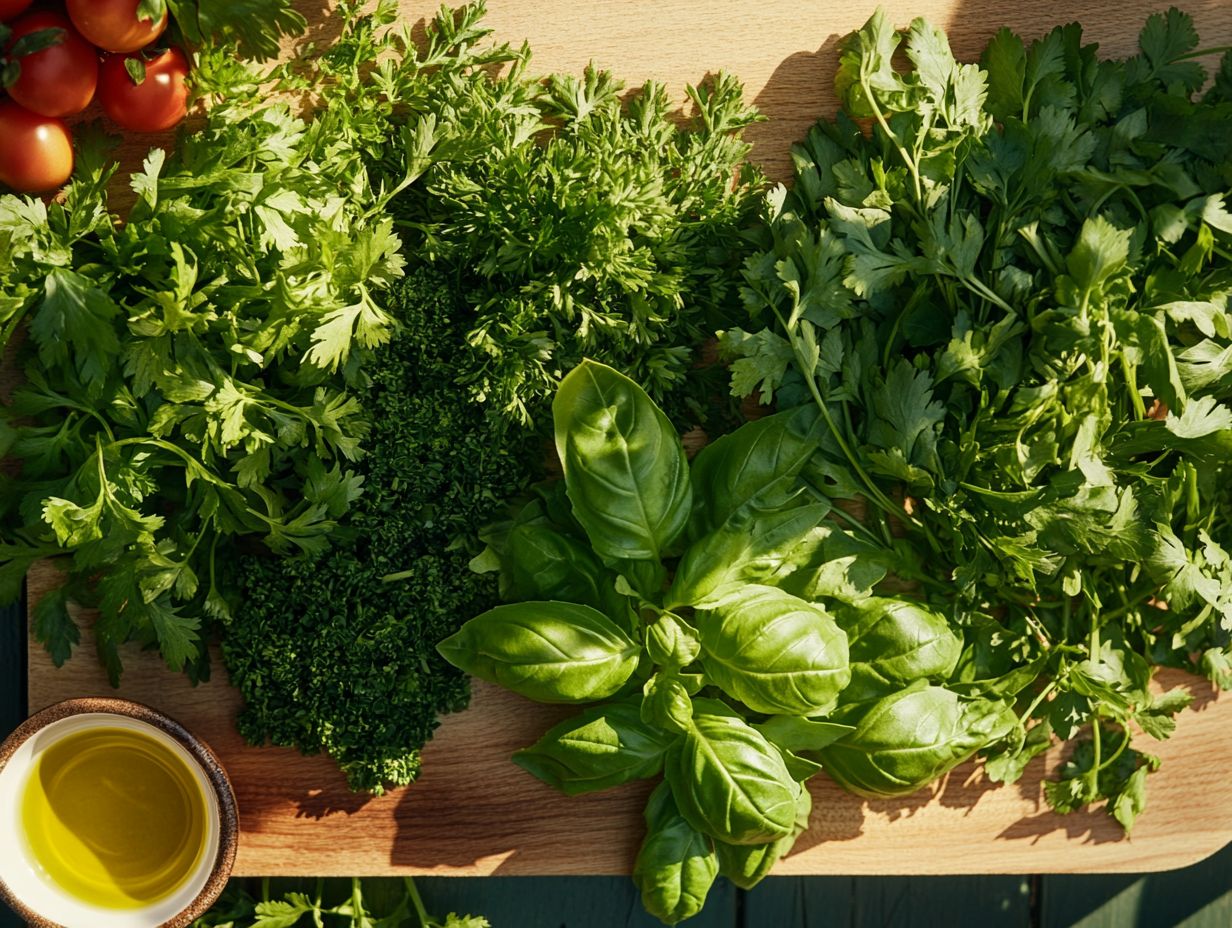
Cultivating your own edible herbs is a truly rewarding endeavor. It offers fresh ingredients for your culinary creations while enriching your gardening expertise.
The beauty of an herb garden is its adaptability. Whether on a cozy windowsill or in a spacious backyard, it provides an accessible opportunity for anyone eager to cultivate their own flavors.
With attentive care, you can savor seasonal herbs throughout the year. Many varieties are simple to grow, making them perfect for beginners ready to embark on this flavorful journey.
Embrace the satisfaction of nurturing your own herbs. Start growing your own herbs today and transform your meals into culinary masterpieces!
Benefits of Growing Your Own Herbs
Growing your own herbs is rewarding. You can enjoy fresh flavors without frequent trips to the store.
You’ll connect with your food as you learn how to care for each plant. This experience enriches your cooking and gardening skills.
Not only do you save money on expensive store-bought herbs, but fresh herbs also boost your health with essential nutrients and antioxidants.
Growing herbs lowers the distance food travels and reduces packaging waste, making it a sustainable choice. If you’re new to gardening, start in a sunny spot with easy herbs like basil or mint.
This journey brings joy and rewarding flavors to your kitchen!
Easy-to-Grow Herbs for Beginners
Choosing easy-to-grow herbs can make your gardening experience enjoyable and fulfilling. Varieties like basil, parsley, and mint are kitchen staples that are simple to cultivate, making them perfect for beginners.
Starting with these herbs helps you build confidence and knowledge about herb care, laying a strong foundation for a diverse garden.
Chives and cilantro are excellent additions, requiring minimal effort while providing lush greenery. Chives thrive in well-drained soil and enjoy full sunlight, making them ideal for sunny windowsills or backyards.
Cilantro flourishes in cooler weather, so plant it in early spring or fall for a bountiful harvest. Each of these herbs not only adds vibrant flavors to your dishes but also enhances your cooking abilities.
Embrace the simplicity of these herbs; every culinary creation you make is a testament to your growing skills.
Frequently Asked Questions
What are the most common edible herbs?
The most common edible herbs include basil, rosemary, thyme, oregano, parsley, and mint.
What are the health benefits of consuming edible herbs?
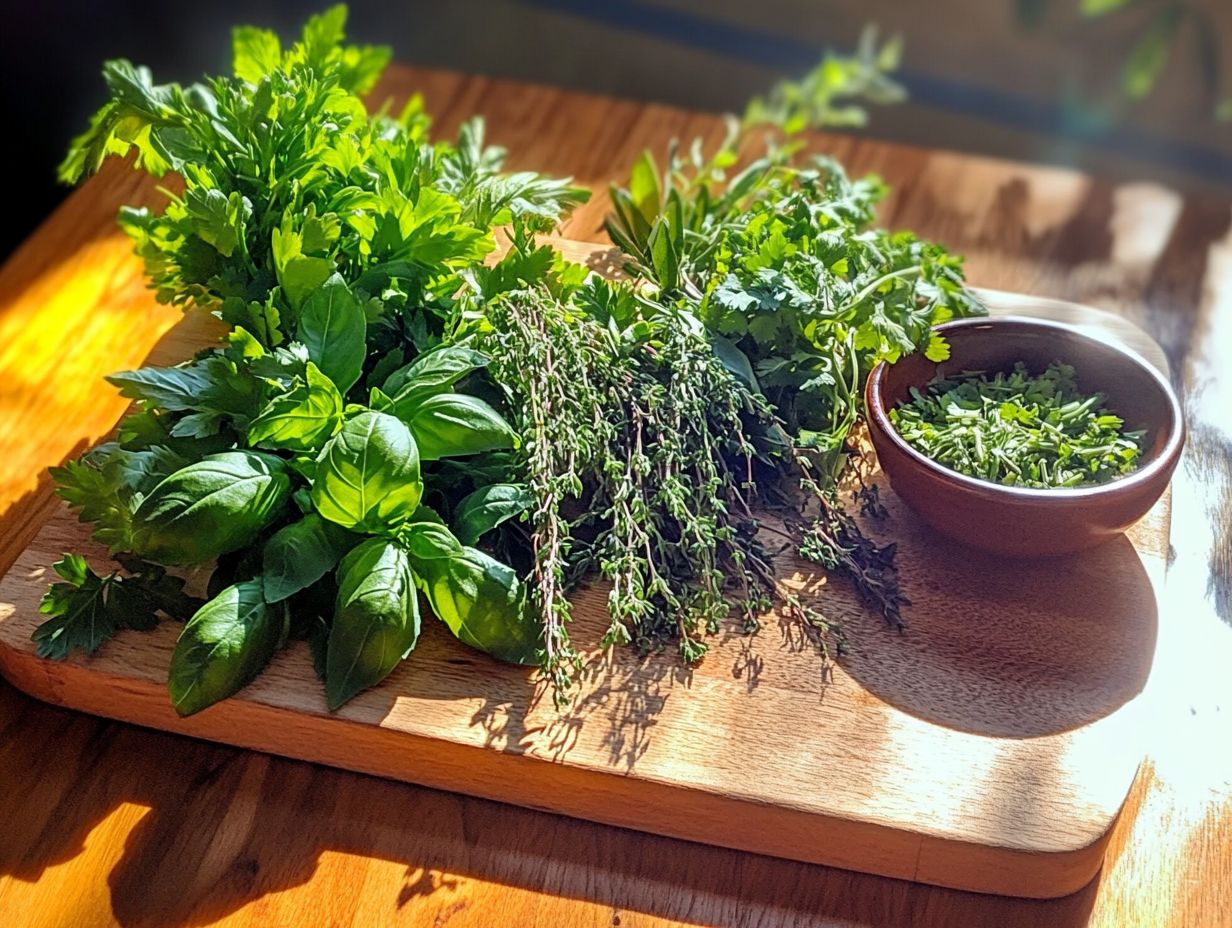
Edible herbs are packed with nutrients and offer numerous health benefits, such as boosting immunity, improving digestion, reducing inflammation, and providing antioxidants.
Can I grow my own edible herbs?
Yes, you can easily grow many common edible herbs in a small garden or even in pots on a windowsill. Just be sure to research proper growing techniques for each herb.
How should I store fresh edible herbs?
Store fresh herbs in the refrigerator for several days. To keep them fresh longer, wrap them in damp paper towels and place them in a sealed plastic bag.
What are some ways to use edible herbs in cooking?
Use edible herbs in various ways, such as adding them to sauces, marinades, salads, soups, and even beverages. They also make excellent garnishes for added flavor and visual appeal.
Are there any precautions to take when consuming edible herbs?
While most edible herbs are safe to eat, it’s essential to research and check for potential allergies or interactions with medications. Also, make sure to wash and prepare the herbs properly before consuming them.


